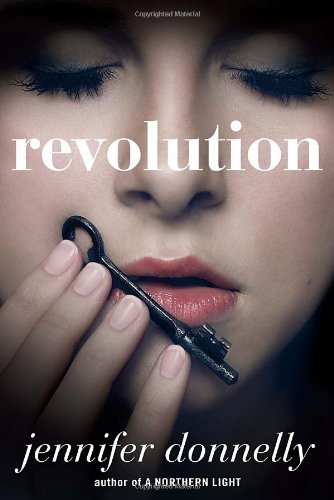All Nonfiction
- Bullying
- Books
- Academic
- Author Interviews
- Celebrity interviews
- College Articles
- College Essays
- Educator of the Year
- Heroes
- Interviews
- Memoir
- Personal Experience
- Sports
- Travel & Culture
All Opinions
- Bullying
- Current Events / Politics
- Discrimination
- Drugs / Alcohol / Smoking
- Entertainment / Celebrities
- Environment
- Love / Relationships
- Movies / Music / TV
- Pop Culture / Trends
- School / College
- Social Issues / Civics
- Spirituality / Religion
- Sports / Hobbies
All Hot Topics
- Bullying
- Community Service
- Environment
- Health
- Letters to the Editor
- Pride & Prejudice
- What Matters
- Back
Summer Guide
- Program Links
- Program Reviews
- Back
College Guide
- College Links
- College Reviews
- College Essays
- College Articles
- Back
Revolution by Jennifer Donnelly
I started reading this book the day after Christmas and finished it the day after Christmas.
First let me say that I loved it! Having established that, moving on to a few of the things I didn't like: The narrative is split between Andi, a teenage girl living in modern New York (although for most of the story she's in Paris), and Alexandrine, a young girl trying to survive during the French Revolution in Paris. I liked, but didn't love, the historical flashbacks--while they were well-designed and well blended into the modern part of the story, they just weren't as captivating as Andi's story.
While I was reading it, the French Revolution parts seemed fairly realistic: The little bit of history I knew about that time period suggested no inconstancies, but after reading several online reviews which complain about various unfeasible aspects, I became slightly annoyed with the author. We read about Alexandrine's life through her diary, but someone pointed out that the amount of detail included in the diary is extremely unrealistic given the amount of paper available at the time--I agree with that, although I wouldn't have come up with it on my own. Other complaints included too quick of dénouement (I agree) and the absurdity of Andi's "unnecessary" flashback/journey to the 18th century (it was far-fetched, but it also made me feel more connected to the 18th century supporting characters).
The book opens with two lines that are profound, insouciant, and hint of a musical theme to come: "Those who can, do. Those who can't, deejay." Andi, the depressed, suicidal high-school protagonist, is our narrator. She tells us about her brother's death, her mother's deep depression, and her father's fumbling attempts to make the family whole again. After realizing Andi is failing all of her classes except music, her father forces her to accompany him to Paris, where's he's tracking the heart of Louis XVII of France, and Andi will complete her senior thesis before she's allowed to return home and see her mother (who's been checked into a mental hospital by her dad).
Once in Paris, Andi finds an ancient guitar case with a miniature portrait closely resembling her brother, and a small book: Alexandrine's diary. Andi reads the diary alongside us, as she sits in cafés and plays guitar under the Eiffel Tower. She feels it calling to her constantly, and some unlikely coincidences are "arranged" by Alex so Andi will have time to finish the diary.
Andi, who's taking Quellify (an anti-depressent) throughout the book, is literally steps away from committing suicide several time through the story. Vijay, her best friend from school, is a method of comic relief for both Andi and the reader: He's willing, in a casual way, to do anything for his friend, and talks her out of suicide more than once.
Virgil, a friend of a street musician Andi meets near the Eiffel Tower one night, seems to be Andi's only reason to live for much of the later half of the book. Although she's only known him for a few days, they form an instant connection over music, and have long cell-phone conversations in the middle of the night. She is quickly in love with him, and much of the "opening" of her character is due to the dreamy French/Tunisian.
The ending is rather abrupt, but being on the uncritical side, it didn't bother me too much. (No spoilers here, read with abandon!) It was realistic enough that I could accept it and go "Awww" but if you like your books real instead of unromantic, be prepared.
Also, unless you're a French culture buff, there are many references to French nuances that the average American reader, especially younger ones, won't understand. I found them mildly irritating but not plot-breaking.
One of my favorite scenes in the book is when Virgil and Andi go to Sacre-Coeur early in the morning and watch the sunrise-I recently went to France and joined the two characters to see the incredible view over early morning Paris.
There are adult themes (drinking, drugs, swearing, depression, and bad parenting) in this book, but it's not terribly inappropriate for readers under 12. However, the older you are, the more you'll identify with Andi's experiences.
Other things I liked about this book:
The cover. My edition was a perfect representation of the story, and I can't get enough of the picture.
The musical theme: I'm a musician, and I love identifying with musical characters when I read. The lyrics--some from published songs and some written by the author for her characters--were a wonderful addition to the story.
The size of the hardback edition was perfect-just tall enough so the number of pages wasn't overwhelming, but not gigantic.
The imagery, throughout the book, is very vivid and clings to the reader after finishing the book.
Similar Articles
JOIN THE DISCUSSION
This article has 0 comments.

